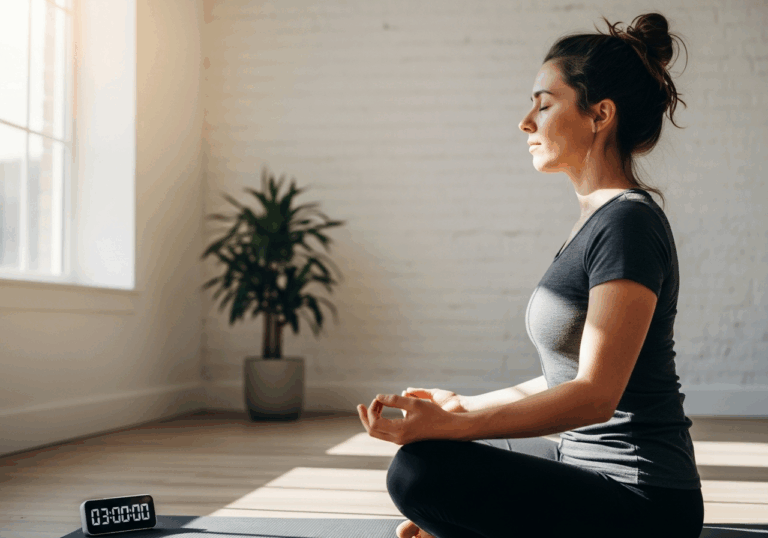Science-Backed Tips
Boost Your Mood with Resonance Breathing
15% increase in vagal tone from just 6 minutes of breathing.
📊 Did you know?
💡 Why It Matters
1️⃣
Improving vagal tone can lead to better emotional regulation and lower stress levels.
2️⃣
Enhanced HF HRV is associated with reduced anxiety and improved overall mental health.
3️⃣
Quick breathing exercises can serve as an effective tool for immediate stress relief.
✅ Try These Micro-Tips
🎯
Practice resonance breathing for 6 minutes daily to enhance mood.
🎯
Incorporate deep breathing exercises into your routine at least 3 times a week.
🎯
Use guided breathing apps to maintain consistency in practice.
🎯
Combine breathing exercises with mindfulness for greater emotional benefits.
📚 The study
The objective was to examine the acute effects of heart rate variability biofeedback (HRVB) through brief breathing exercises. The results were remarkable: participants experienced a ~15% increase in high-frequency heart rate variability (HF HRV) and improved baroreflex gain.
This physiological modulation not only signifies fast stress relief but also highlights the potential for quick breathing exercises to serve as an effective tool for managing anxiety and enhancing overall mental health.
By improving vagal tone, individuals can achieve better emotional regulation and lower stress levels, making resonance breathing a valuable practice for anyone seeking to improve their well-being.
The study underscores the importance of integrating such techniques into our daily routines, as they can lead to significant improvements in mood and stress management.
So, if you’re looking for a quick and effective way to boost your mood and reduce stress, consider dedicating just six minutes to resonance breathing. It could be the key to unlocking a more balanced and happier you.
❓ Frequently Asked Questions ❓
Learn more
What is resonance breathing?
Resonance breathing is a technique that involves breathing at a specific rate to enhance heart rate variability (HRV). It promotes parasympathetic activation, which can improve mood and reduce stress levels.
How long should I practice resonance breathing for benefits?
A brief session of resonance breathing for just 6 minutes can significantly enhance heart rate variability and mood. Regular practice can lead to improved emotional regulation and lower stress levels.
What are the benefits of increased HF HRV?
Increased high-frequency heart rate variability (HF HRV) is associated with reduced anxiety and improved overall mental health. It indicates better vagal tone, which is crucial for emotional regulation.
How does resonance breathing affect vagal tone?
Resonance breathing enhances vagal tone by promoting immediate parasympathetic activation. This physiological modulation can lead to improved mood and stress relief.
Can breathing exercises help with stress relief?
Yes, quick breathing exercises, such as resonance breathing, can serve as effective tools for immediate stress relief. They help to modulate physiological responses and elevate mood.
How often should I practice deep breathing exercises?
It is recommended to incorporate deep breathing exercises into your routine at least three times a week. Consistent practice can lead to long-term benefits for mental health and emotional well-being.
Are there any tools to help with breathing exercises?
Guided breathing apps can be very helpful in maintaining consistency in your breathing practice. They provide structured sessions and reminders to help you stay on track.
Can I combine breathing exercises with other practices?
Yes, combining breathing exercises with mindfulness can enhance the emotional benefits. This combination can lead to greater stress relief and improved emotional regulation.
What is baroreflex gain and why is it important?
Baroreflex gain refers to the body’s ability to regulate blood pressure through heart rate variability. Improved baroreflex gain, as seen with resonance breathing, indicates better cardiovascular health and stress resilience.
What immediate effects can I expect from resonance breathing?
After just 6 minutes of resonance breathing, you can expect an increase in HF HRV by approximately 15%, along with improved mood. This quick practice can provide fast stress relief through physiological modulation.





